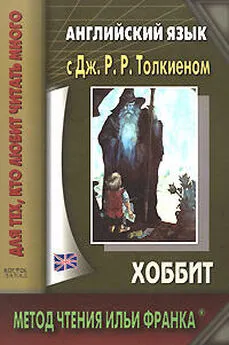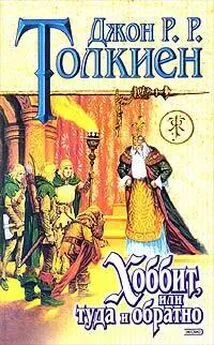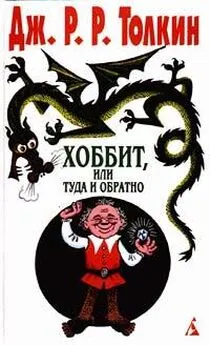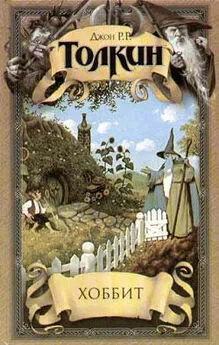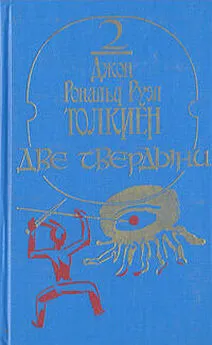Джон Толкиен - Английский язык с Дж. Р. Р. Толкиеном. Хоббит
- Название:Английский язык с Дж. Р. Р. Толкиеном. Хоббит
- Автор:
- Жанр:
- Издательство:АСТ, Восток-Запад
- Год:2008
- Город:Москва
- ISBN:978-5-17-048593-2, 978-5-478-00597-9
- Рейтинг:
- Избранное:Добавить в избранное
-
Отзывы:
-
Ваша оценка:
Джон Толкиен - Английский язык с Дж. Р. Р. Толкиеном. Хоббит краткое содержание
В книге предлагается произведение на английском языке Джона Р. Р. Толкиена «Хоббит», адаптированное (без упрощения текста оригинала) по методу Ильи Франка. Уникальность метода заключается в том, что запоминание слов и выражений происходит за счет их повторяемости, без заучивания и необходимости использовать словарь.
Пособие способствует эффективному освоению языка, может служить дополнением к учебной программе.
Предназначено для студентов, для изучающих английский язык самостоятельно, а также для всех интересующихся английской культурой.
Пособие подготовила Ольга Ламонова.
Английский язык с Дж. Р. Р. Толкиеном. Хоббит - читать онлайн бесплатно полную версию (весь текст целиком)
Интервал:
Закладка:
Then he strode off (затем он ушел большими шагами) to help in the ordering of the camps (чтобы помочь в устройстве лагерей; to order — приводить в порядок; order — порядок ) and in the care of the sick and the wounded (и /оказании/ заботы больным и раненным; wound — рана, ранение; to wound — ранить ). But the Master scowled at his back (но Глава бросил на его спину сердитый взгляд; to scowl — сердито смотреть, хмуриться ) as he went (когда тот ушел), and remained sitting on the ground (и остался сидеть на земле). He thought much but said little (он думал много, но сказал мало), unless it was to call loudly for men (он только громко позвал слуг; unless — если не, пока не, разве только, не считая ) to bring him fire and food (чтобы ему принесли огня и пищи).
Now everywhere Bard went (теперь везде, куда шел Бард) he found talk running like fire (он обнаруживал, что разговоры распространялись: «пробегали» подобно огню) among the people (среди людей) concerning the vast treasure (относительно бесчисленного: «обширного» сокровища; to concern — касаться, иметь отношение ) that was now unguarded (что сейчас осталось без охраны: «было теперь неохраняемым»). Men spoke of the recompense for all their harm (люди говорили о возмещении всех их убытков; harm — вред, ущерб, зло ) that they would soon get from it (которое они вскоре получат от него /сокровища/), and wealth over and to spare (и богатства в избытке: «сверх и чтобы /еще/ сберечь = отложить) with which to buy rich things from the South (при помощи которого они накупят роскошных вещей на Юге: «с Юга»); and it cheered them greatly in their plight (и это чрезвычайно поддерживало их в их трудном положении). That was as well (и это было даже к лучшему), for the night was bitter and miserable (так как ночь была мучительной и скверной). Shelters could be contrived for few (временные жилища были устроены лишь для немногих; shelter — кров, пристанище, приют; to contrive — придумывать, изобретать; разрабатывать ) (the Master had one (у Главы Города он был)) and there was little food (и еды было немного) (even the Master went short (даже у Главы Города /припасы/ закончились; to go (went, gone) short = to run short — истощаться, подходить к концу )). Many took ill (многие заболели) of wet (от сырости) and cold (и холода) and sorrow (и печали) that night (в ту ночь), and afterwards died (и впоследствии умерли; to die — умирать ), who had escaped uninjured (те, кто сумел убежать без повреждений; to injure — ушибить, повредить, причинить боль; (un) injured — (не) пострадавший, (не) получивший повреждений ) from the ruin of the town (из-под развалин города); and in the days that followed (и те дни, что последовали) there was much sickness (было много заболеваний; sickness — болезнь, заболевание, тошнота ) and great hunger (и сильный голод). Meanwhile Bard took the lead (тем временем Бард взял на себя руководство; to take the lead — брать на себя руководство, проявлять инициативу; lead — руководство, инициатива ), and ordered things as he wished (и отдавал приказы по наведению порядка, как он того желал), though always in the Master’s name (хотя всегда от имени Главы Города), and he had a hard task (и у него была довольно трудная задача) to govern the people (управлять людьми) and direct the preparations (и направлять /работы/ по приготовлению) for their protection and housing (для их защиты и обеспечения жильем; tohouse — предоставлять жилище, обеспечивать жильем, приютить ). Probably most of them (возможно, что большинство из них) would have perished in the winter (погибли бы этой зимой) that now hurried after autumn (что теперь уж торопилась вслед за осенью), if help had not been to hand (если бы им не была оказана своевременная помощь: «если бы помощь не была под рукой»).
wounded [ˈwu: ndɪd] unguarded [ʌnˈɡɑ: dɪd] plight [plaɪt] uninjured [ʌnˈɪndʒǝd]
Then he strode off to help in the ordering of the camps and in the care of the sick and the wounded. But the Master scowled at his back as he went, and remained sitting on the ground. He thought much but said little, unless it was to call loudly for men to bring him fire and food. Now everywhere Bard went he found talk running like fire among the people concerning the vast treasure that was now unguarded. Men spoke of the recompense for all their harm that they would soon get from it, and wealth over and to spare with which to buy rich things from the South; and it cheered them greatly in their plight. That was as well, for the night was bitter and miserable. Shelters could be contrived for few (the Master had one) and there was little food (even the Master went short). Many took ill of wet and cold and sorrow that night, and afterwards died, who had escaped uninjured from the ruin of the town; and in the days that followed there was much sickness and great hunger. Meanwhile Bard took the lead, and ordered things as he wished, though always in the Master’s name, and he had a hard task to govern the people and direct the preparations for their protection and housing. Probably most of them would have perished in the winter that now hurried after autumn, if help had not been to hand.
But help came swiftly (но помощь пришла быстро); for Bard at once (так как Бард немедленно) had speedy messengers sent up the river (отправил быстрых гонцов вверх по реке) to the Forest (к Лесу) to ask the aid of the King of the Elves of the Wood (чтобы попросить помощи у Короля Лесных Эльфов), and these messengers (и эти гонцы) had found a host already on the move (обнаружили войско уже в пути; host — /поэт. арх. / войско, воинство; on the move — в движении, на ногах ), although it was then only the third day (хотя тогда был только третий день) after the fall of Smaug (после падения Смауга). The Elvenking had received news (Король эльфов получил новости) from his own messengers (от своих собственных гонцов) and from the birds that loved his folk (и от птиц, которым нравился его народ), and already knew much (и он уже знал многое) of what had happened (из того, что случилось). Very great indeed was the commotion (в действительности очень велико было беспокойство) among all things with wings (среди всех крылатых существ: «существ с крыльями») that dwelt on the borders (что обитали на границах) of the Desolation of the Dragon (Драконова Запустения). The air was filled with circling flocks (воздух был наполнен кружащимися стаями; flock — стадо; стая ), and their swift-flying messengers (и их быстрокрылые: «быстро летающие» гонцы) flew here and there across the sky (летали там и здесь по небу). Above the borders of the Forest (над границами Леса) there was whistling (раздавался свист; to whistle — свистеть ), crying and piping (крики и щебет; piping — игра на свирели; пронзительный резкий звук ). Far over Mirkwood tidings spread (далеко над Мрачным Лесом распространялись известия): “Smaug is dead (Смауг мертв)!” Leaves rustled (листва шуршала) and startled ears were lifted (и встревоженные уши поднимались: «были подняты»; to startle — испугать, напугать, встревожить ). Even before the Elvenking rode forth (даже до того, как Король эльфов отправился верхом вперед) the news had passed west (новости отправились на запад) right to the pinewoods of the Misty Mountains (прямо до сосновых лесов Мглистых Гор); Beorn had heard it in his wooden house (Беорн услышал эти /новости/ в своем деревянном доме), and the goblins were at council in their caves (и гоблины /собрались/ на совещание в своих пещерах).
messenger [ˈmes (ǝ) ndʒǝ] whistling [ˈwɪslɪŋ] piping [ˈpaɪpɪŋ] council [ˈkaʋns (ǝ) l]
But help came swiftly; for Bard at once had speedy messengers sent up the river to the Forest to ask the aid of the King of the Elves of the Wood, and these messengers had found a host already on the move, although it was then only the third day after the fall of Smaug. The Elvenking had received news from his own messengers and from the birds that loved his folk, and already knew much of what had happened. Very great indeed was the commotion among all things with wings that dwelt on the borders of the Desolation of the Dragon. The air was filled with circling flocks, and their swift-flying messengers flew here and there across the sky. Above the borders of the Forest there was whistling, crying and piping. Far over Mirkwood tidings spread: “Smaug is dead!” Leaves rustled and startled ears were lifted. Even before the Elvenking rode forth the news had passed west right to the pinewoods of the Misty Mountains; Beorn had heard it in his wooden house, and the goblins were at council in their caves.
“That will be the last (это будет последний раз) we shall hear of Thorin Oakenshield (когда мы услышим о Торине Оукеншильде), I fear (я боюсь), ” said the king (сказал король). “He would have done better (он поступил бы гораздо лучше) to have remained my guest (останься он моим гостем). It is an ill wind (но нет худа: «дурной тот ветер»), all the same (все равно), ” he added (добавил он), “that blows no one any good (без добра: «который никому не приносит хоть какой-нибудь пользы»). ” For he too had not forgotten (так как он тоже не забыл) the legend of the wealth of Thror (легенду о богатстве Трора). So it was (вот как получилось) that Bard’s messengers (что гонцы Барда) found him now marching (обнаружили, что он теперь двигался маршем) with many spearmen and bowmen (со множеством копьеносцев и лучников); and crows were gathered thick (и много воронов собрались; thick — толсто, густо, в большом количестве ), above him (над ним), for they thought (так как они думали) that war was awakening again (что снова начинается война; to awaken — пробуждать ), such as had not been in those parts (такая, какой не было в этих краях) for a long age (уже очень давно: «долгий период времени»; age — возраст; продолжительность, период ). But the king (но король), when he received the prayers of Bard (когда он получил мольбы Барда), had pity (сжалился; pity — жалость, сострадание ), for he was the lord of a good and kindly people (так как он был властелином хорошего и доброго народа); so turning his march (и, повернув свое походное движение), which had at first been direct towards the Mountain (которое по началу вело напрямую к Горе), he hastened now down the river (он поспешил теперь вниз по реке) to the Long Lake (к Длинному Озеру). He had not boats or rafts enough (у него не было достаточно лодок или плотов) for his host (для своего войска), and they were forced (и они были вынуждены) to go the slower way by foot (идти более медленным путем пешком); but great store of goods (но большие запасы /всего/ необходимого; goods — вещи, имущество; то, что требуется ) he sent ahead by water (он отправил вперед по воде). Still elves are light-footed (все же эльфы проворны; light-footed — быстроногий, проворный, с легкой походкой ), and though they were not in these days much used to the marches (и, хотя они в те дни не очень-то привыкли к походам) and the treacherous lands between the Forest and the Lake (и к ненадежным землям между Лесом и Озером; treacherous—предательский, коварный ), their going was swift (их продвижение оказалось быстрым). Only five days after the death of the dragon (спустя только пять дней после смерти дракона) they came upon the shores (они вышли на берега) and looked on the ruins of the town (и взглянули на развалины города). Their welcome was good (приняли их хорошо: «их прием был хорошим»), as may be expected (как и можно было ожидать), and the men and their Master (и люди и их Глава) were ready to make any bargain (были готовы заключить любую сделку) for the future (на будущее) in return for the Elvenking’s aid (в обмен на помощь Короля эльфов).
Читать дальшеИнтервал:
Закладка:
